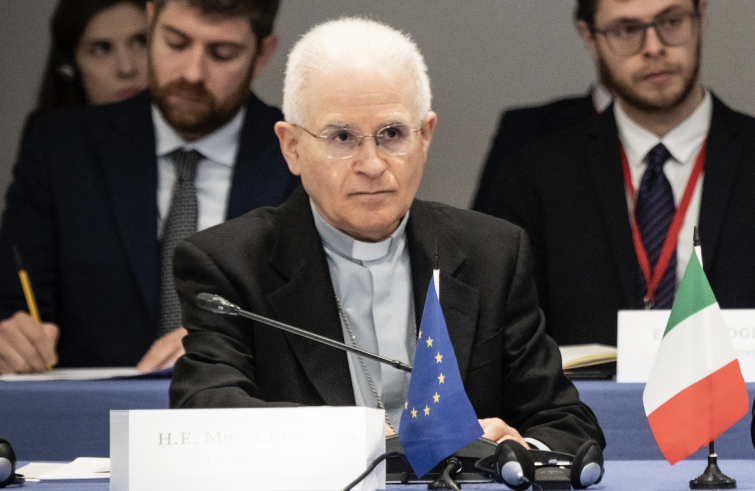
“The adoption of this Resolution by the European Parliament saddens us deeply. As COMECE Bishops, we expressed our disappointment in a statement published a few days ago. We cannot but express our disagreement.” This was the reaction of Monsignor Mariano Crociata, Bishop of Latina and President of the Commission of the Bishops’ Conferences of the European Union (COMECE), to the Resolution adopted on Thursday 11 April in the European Parliament with 336 votes in favour, 163 against and 39 abstentions, in which MEPs declare their intention to incorporate access to abortion into the EU Charter of Fundamental Rights. “Abortion cannot be considered a human right, because the suppression of human life is never a human right,” said Msgr. Crociata.
“Some call it a clump of cells,” he said, “but in fact it is the beginning of a new life.”
Ensuring high-quality health care for all women was the Resolution’s underlying objective. Here again, Msgr. Crociata disagrees. “This vote will not help the situation of women,” he says. “Hindering motherhood is not the way to support women, who always need support, help and respect for the decisions they make.” The text adopted on Thursday urges EU countries to remove and combat all barriers to abortion, and specifically calls on Poland and Malta to repeal their laws and other measures that prohibit or restrict access to abortion. “This is contrary to EU law,” the EU bishops’ president said. “In fact, it has no regard for the different orientations and sensitivities of the different nations and peoples who have competence in this matter. As a result, the resolution has the additional effect of causing division and discord within the European Union. It is tantamount to denying the very identity, history, mission and even the future of the European Union.” Finally, regarding the “conscientious objection” clause proposed by some medical professionals and condemned in the Resolution for causing delays and health risks, Bishop Crociata reiterated: “The restrictions on freedom of conscience, which is one of the fundamental principles guaranteeing respect for the individual and for democracy, is something we are gravely concerned about.”
“Restricting freedom of conscience is a threat to freedom, a course of action that ultimately strongly reminds us of an authoritarian regime. We hope that our European Parliament will not go down this road”.
 Also commenting on the issue, Fr Manuel Barrios Prieto, General Secretary of COMECE, said: “We are saddened to see that some political parties with Christian Democratic roots, such as the European People’s Party, are divided on this issue today,” he said. “Indeed, although a large number of them have voted against the motion, it should also be noted that a significant number voted in favour of it. It is somewhat outrageous when you think about it.” “When it comes to issues of this kind, MEPs may vote for or against for reasons of party allegiance, or out of ignorance and lack of knowledge of the issue,” the priest said. “We call on political parties and politicians to act responsibly as the European elections approach.” “Our hope is that the new parliament that will be the result of the upcoming elections will take these issues to heart. But that will depend on the voters.” The Secretary General of COMECE made no secret of the fact that the vote “saddens us deeply, although it was to be expected.” The bishops had expressed the position of the Catholic Church in a statement ahead of the vote, in which they reaffirmed, as Fr Barrios Prieto recalled, that “abortion cannot be considered a right. The fundamental human right is the right to life. Death is clearly its denial.”
Also commenting on the issue, Fr Manuel Barrios Prieto, General Secretary of COMECE, said: “We are saddened to see that some political parties with Christian Democratic roots, such as the European People’s Party, are divided on this issue today,” he said. “Indeed, although a large number of them have voted against the motion, it should also be noted that a significant number voted in favour of it. It is somewhat outrageous when you think about it.” “When it comes to issues of this kind, MEPs may vote for or against for reasons of party allegiance, or out of ignorance and lack of knowledge of the issue,” the priest said. “We call on political parties and politicians to act responsibly as the European elections approach.” “Our hope is that the new parliament that will be the result of the upcoming elections will take these issues to heart. But that will depend on the voters.” The Secretary General of COMECE made no secret of the fact that the vote “saddens us deeply, although it was to be expected.” The bishops had expressed the position of the Catholic Church in a statement ahead of the vote, in which they reaffirmed, as Fr Barrios Prieto recalled, that “abortion cannot be considered a right. The fundamental human right is the right to life. Death is clearly its denial.”
The Church always defends “human life, especially when in a situation of vulnerability such as the life of the unborn child in the mother’s womb.”
Father Manuel Barrios Prieto recalled that the bishops have also emphasised that the European Union “must respect the different cultures and traditions of the Member States and their national competences”. In short, the priest concluded, the bishops have spoken clearly on this issue.
“Unfortunately, we see that Parliament continues to vote along the same lines, and this saddens us.”








